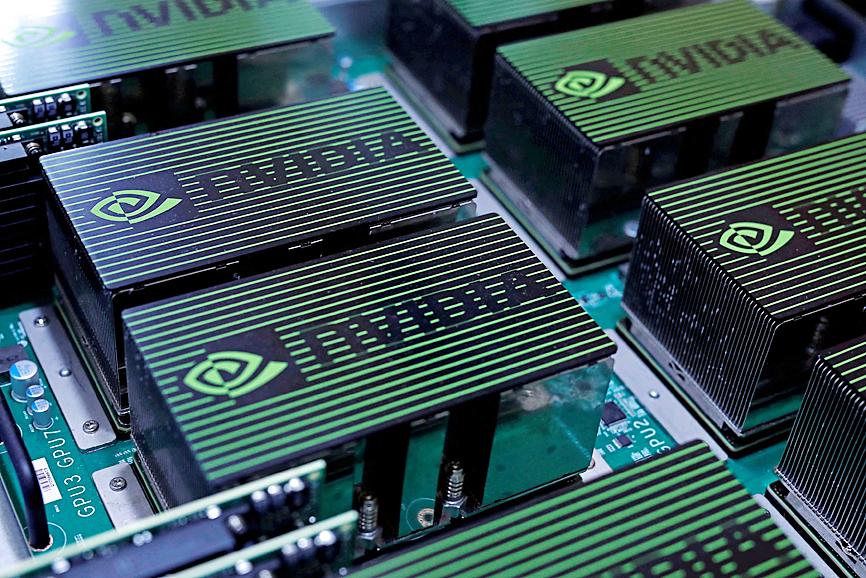Nvidia Corp on Tuesday told investors that it is focused on maintaining growth with new products, including speedier data center chips, rather than embarking on more aggressive stock buyback plans as some shareholders had hoped.
Nvidia chief financial officer Colette Kress told an investors’ meeting that the company’s priority is using cash to expand its business.
Nvidia has bought back US$2 billion in stock this quarter, she said.

Photo: Tyrone Siu, Reuters
However, the company has not increased its budget for repurchases.
Nvidia has US$5 billion of buyback authorization left, Kress said.
Some investors had been eyeing additional buybacks after Nvidia walked away from a US$40 billion plan to acquire Arm Ltd last month, Citigroup Inc and Bank of America Corp said.
Nvidia shares slipped as much as 2.5 percent following Kress’ remarks, but soon recovered.
Nvidia’s focus is new products and technology aimed at continuing its rapid growth in artificial intelligence (AI) processing, it said.
Graphics chips based on the new “Hopper” design are to debut later this year, the company said.
The processors are created with as many as 80 billion transistors and — when paired with new connecting chips — would massively speed up the development of software that understands human speech and does genomic research.
Under Nvidia chief executive officer Jensen Huang (黃仁勳), the firm has parlayed its dominance of graphics chips prized by computer gamers into a lucrative position in server technology. The company supplies chips to the owners of some of the world’s largest data centers, which use the technology to power the AI software needed to make sense of the growing flood of digital information.
Nvidia’s Hopper technology, named for computer science pioneer Grace Hopper, is its latest offering. It contains circuitry specifically designed to run so-called transformer machine learning models, which are used to improve the way that machines respond to human speech.
Hopper would also better link with other chips, allowing it to remove some of the bottlenecks caused by transferring huge data sets between parts of a computer.
Nvidia is to rely on contract manufacturer Taiwan Semiconductor Manufacturing Co (台積電) to make the chips.
Alibaba Cloud, Amazon.com Inc’s Amazon Web Services, Alphabet Inc’s Google Cloud and Microsoft Corp’s Azure are among the large companies that would adopt the new chips, Nvidia said.
In addition, computer makers such as Dell Technologies Inc and Hewlett Packard Enterprise Co are to offer machines based on the silicon.
Nvidia also announced the availability of the Grace CPU Superchip, its brand name for a new central processing unit for high-end data center computing.
That product is its initial foray into the bigger market for CPUs — a field where Intel Corp technology remains dominant, but is facing greater pressure from new entrants.

Intel Corp chief executive officer Lip-Bu Tan (陳立武) is expected to meet with Taiwanese suppliers next month in conjunction with the opening of the Computex Taipei trade show, supply chain sources said on Monday. The visit, the first for Tan to Taiwan since assuming his new post last month, would be aimed at enhancing Intel’s ties with suppliers in Taiwan as he attempts to help turn around the struggling US chipmaker, the sources said. Tan is to hold a banquet to celebrate Intel’s 40-year presence in Taiwan before Computex opens on May 20 and invite dozens of Taiwanese suppliers to exchange views

Application-specific integrated circuit designer Faraday Technology Corp (智原) yesterday said that although revenue this quarter would decline 30 percent from last quarter, it retained its full-year forecast of revenue growth of 100 percent. The company attributed the quarterly drop to a slowdown in customers’ production of chips using Faraday’s advanced packaging technology. The company is still confident about its revenue growth this year, given its strong “design-win” — or the projects it won to help customers design their chips, Faraday president Steve Wang (王國雍) told an online earnings conference. “The design-win this year is better than we expected. We believe we will win

Chizuko Kimura has become the first female sushi chef in the world to win a Michelin star, fulfilling a promise she made to her dying husband to continue his legacy. The 54-year-old Japanese chef regained the Michelin star her late husband, Shunei Kimura, won three years ago for their Sushi Shunei restaurant in Paris. For Shunei Kimura, the star was a dream come true. However, the joy was short-lived. He died from cancer just three months later in June 2022. He was 65. The following year, the restaurant in the heart of Montmartre lost its star rating. Chizuko Kimura insisted that the new star is still down

While China’s leaders use their economic and political might to fight US President Donald Trump’s trade war “to the end,” its army of social media soldiers are embarking on a more humorous campaign online. Trump’s tariff blitz has seen Washington and Beijing impose eye-watering duties on imports from the other, fanning a standoff between the economic superpowers that has sparked global recession fears and sent markets into a tailspin. Trump says his policy is a response to years of being “ripped off” by other countries and aims to bring manufacturing to the US, forcing companies to employ US workers. However, China’s online warriors